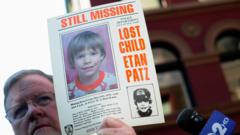The ruling brings renewed attention to one of America's most notorious missing children's cases
Court Grants New Trial for Man Convicted in 1979 Etan Patz Case

Court Grants New Trial for Man Convicted in 1979 Etan Patz Case
Appeals court finds errors in jury instructions, leading to potential release of Pedro Hernandez
In a significant ruling, a US appeals court has ordered a new trial for Pedro Hernandez, the man convicted of killing six-year-old Etan Patz in 1979. This case became a striking example of the national concern over missing children after Patz vanished on his way to a school bus stop in Manhattan, igniting fear throughout the city and prompting a widespread search throughout the country.
Hernandez, who owned a convenience store, was first convicted in 2017 following a trial that came after an initial jury was deadlocked in 2015. His conviction was primarily based on a confession he made to police, claiming he lured Patz into a basement and murdered him. However, Hernandez's defense argued that his confession was coerced and improperly handled, leading to the appeal.
The Second Circuit Court of Appeals highlighted serious flaws in the jury instructions during Hernandez's 2017 trial, determining that they contradicted established federal law. They emphasized that Hernandez struggled with mental health issues and had a low IQ, which raised concerns about the validity of his confession after hours of police questioning without being informed of his rights.
The court noted that a crucial question arose during jury deliberations: whether the jury could overlook Hernandez’s subsequent confessions if they found that the first confession was obtained improperly. The judge’s response to the jury was deemed inadequate and problematic, as it led to a conviction possibly based on insufficient legal grounds.
Manhattan District Attorney's office is presently reviewing the appeals court's decision. The case of Etan Patz remains unresolved, as his body has never been found, and the public outcry surrounding this missing children investigation has had lasting effects on law enforcement practices around the country. Following the court's decision, Hernandez's attorney called for the charges to be dropped, urging the focus to shift towards finding the true culprits behind Patz's disappearance.
Hernandez, who owned a convenience store, was first convicted in 2017 following a trial that came after an initial jury was deadlocked in 2015. His conviction was primarily based on a confession he made to police, claiming he lured Patz into a basement and murdered him. However, Hernandez's defense argued that his confession was coerced and improperly handled, leading to the appeal.
The Second Circuit Court of Appeals highlighted serious flaws in the jury instructions during Hernandez's 2017 trial, determining that they contradicted established federal law. They emphasized that Hernandez struggled with mental health issues and had a low IQ, which raised concerns about the validity of his confession after hours of police questioning without being informed of his rights.
The court noted that a crucial question arose during jury deliberations: whether the jury could overlook Hernandez’s subsequent confessions if they found that the first confession was obtained improperly. The judge’s response to the jury was deemed inadequate and problematic, as it led to a conviction possibly based on insufficient legal grounds.
Manhattan District Attorney's office is presently reviewing the appeals court's decision. The case of Etan Patz remains unresolved, as his body has never been found, and the public outcry surrounding this missing children investigation has had lasting effects on law enforcement practices around the country. Following the court's decision, Hernandez's attorney called for the charges to be dropped, urging the focus to shift towards finding the true culprits behind Patz's disappearance.


















